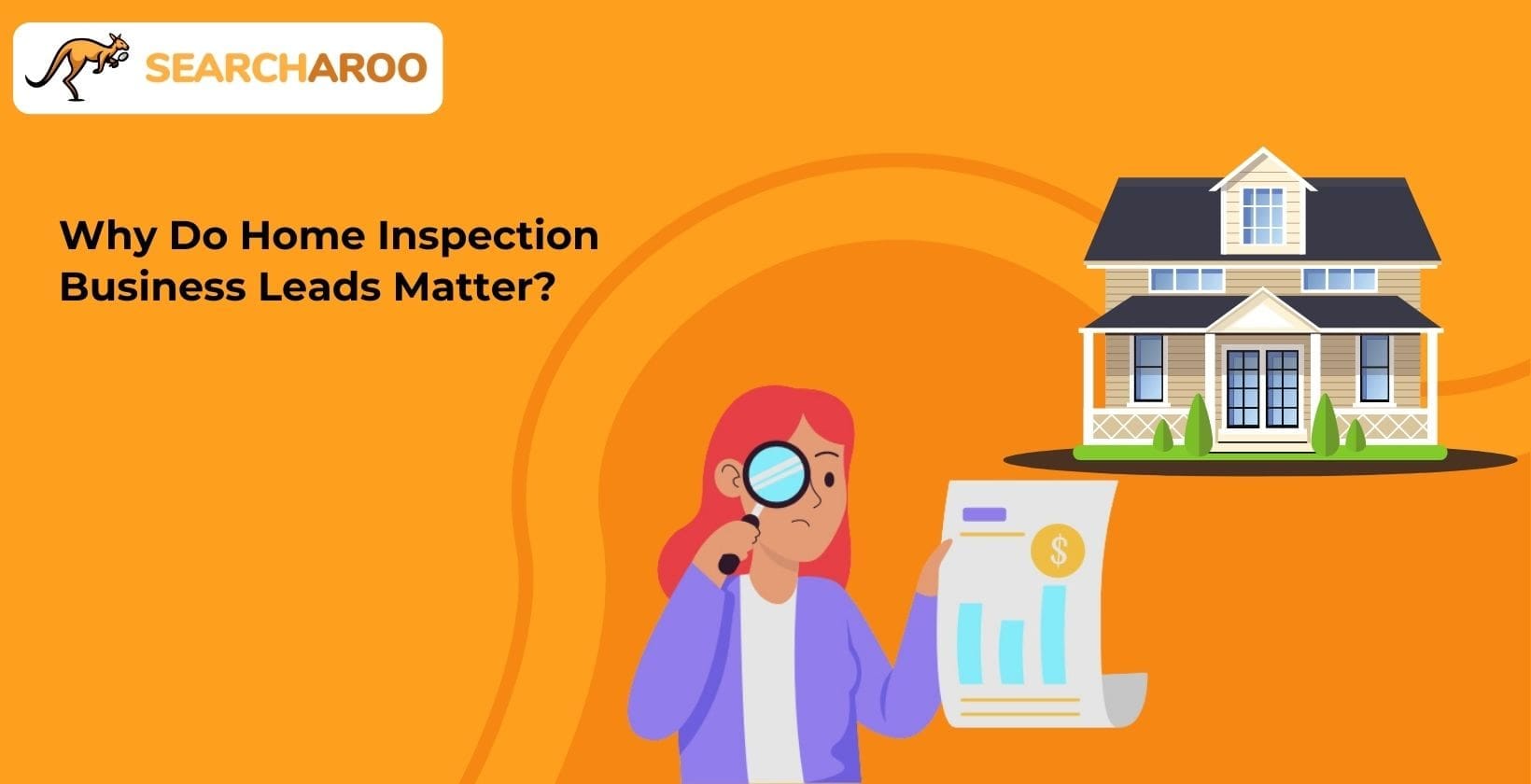Leads are vital for running a home inspection business. They provide a steady stream of potential clients for your home inspection services. A business owner must focus on leads, especially targeting a local market.
However, earning home inspection leads can be challenging. A home inspection professional might spend weeks perfecting their marketing strategy, and attracting prospective customers can be urgent for many companies.
You must understand what attracts people to companies like yours to increase your home inspection leads. But how can you gather more home inspection business leads with lead generation, especially if you’re unsure how to grow your business further?
Consider why these leads matter for your business growth and success to see the impact.
Why Do Home Inspection Business Leads Matter?

Home inspection services are very niche. Other contractors often offer physical changes as part of their marketing strategy. Still, home inspection services can struggle to market their actual services to customers. Not all home buyers know they need inspectors to help them check their homes for safety risks and other concerns.
Whether you’re a new home inspection business or an established owner looking to grow, you need leads. Leads connect you to potential customers. These connections are vital for drawing in clients and converting them into customers.
Business Success
Home inspection leads are essential for business success because they provide a constant supply of clients in this niche service industry, where each new lead represents potential revenue and business growth that sustains operations and enables expansion into new markets.
Professional lead generation allows new and established inspectors to build a larger client base. A lead is any client or potential customer interested in your service. Lead generation focuses on creating more potential clients and leveraging your existing ones.
Understanding the best methods to find leads online can significantly improve your ability to ensure a steady flow of leads.
How to Get Home Inspection Leads?

Generating leads for your home inspection business is crucial for maintaining a steady stream of clients. To attract potential customers, start by optimizing your website for search engines.
Home inspection businesses can generate more leads by optimizing websites for search engines, creating targeted social media campaigns, networking with real estate professionals, offering referral incentives to past clients, and establishing partnerships with local property management companies that regularly need inspection services.
Implement SEO practices to improve your site’s visibility in search results, making it easier for prospective clients to find you. Keywords related to home inspection should be strategically placed throughout your content to capture the interest of people searching for these services.
Social media platforms are another valuable tool for generating leads. Engage with your audience by posting informative content and participating in discussions related to home inspections.
Create targeted ads to reach specific demographics likely to need your services. Additionally, content marketing is an effective strategy. Publish high-quality blog posts, eBooks, and videos that provide valuable information about home inspections.
Offering free resources in exchange for contact information helps build a database of leads for email marketing campaigns.
Home Inspection Lead Generation Services
The most effective marketing strategies for home inspection businesses include targeted SEO with local keywords, relationship-building with real estate agents who can provide referrals, educational content marketing that demonstrates expertise, and maintaining a strong online reputation through customer reviews that showcase reliability and thoroughness.
Most home inspection leads are acquired similarly to other industries. It’s crucial to market effectively to attract potential clients; targeting the right audience ensures the best results. Here are some effective methods to find new home inspection leads.
Remember, each home inspector has unique goals and priorities, so choose the options that will most likely enhance your business and yield better results.
These are the common ways you should mind to boost your lead generation:
Search Engine Optimizatio
SEO plays a crucial role in generating home inspection leads by improving your website’s visibility in local search results, which connects your business with potential clients actively searching for inspection services in your area, resulting in higher-quality leads with stronger purchase intent than those from paid advertising alone.
While SEO might not always be the best option because it relies on customers finding you, it is more affordable and flexible than most lead generation methods. When you do a Google search, your site is judged on several factors and given a rank.
Optimizing your home inspector site can help it appear higher in search results for specific keywords, putting your company in front of people searching for a similar service. Since SEO is complex, consider it a force you can adjust carefully, not a single strategy.
To master SEO, one must consider the power of the right keywords.
Keywords
Keywords are the core of SEO keyword research. This process involves analyzing what other home inspector businesses rank for and understanding what your target audience searches to find you.
Knowing the keywords driving your marketing efforts can help identify potential home inspector niches to target. Some keywords are time-sensitive, others seasonal, and some are so niche that they only apply to specific products.
Differences in audience targeting between you and your competitors mean you can’t always copy their keywords directly.
Look for relevant terms that are frequently searched. Tools like Google Keyword Planner can show how often particular phrases are searched, allowing you to choose those with the highest traffic.
Once you identify relevant keywords, you can align your SEO and Google Ads strategies accordingly. By doing this, you can rank higher for those keywords, gaining more control over your marketing and online presence.
For instance, you can target their keywords to attract first-time home buyers needing an inspection on the earliest business day. Adjust your website content and ads to ensure your services are recommended to them more often.
Depending on your approach, you can treat keywords as a free tool or a path to more paid ads—both valid but different methods.
Effective keyword use can improve visibility and customer acquisition. As you optimize your keywords, another essential element comes into play: the power of backlinks.
Backlinks
A backlink is a major SEO tool. Any link from another website to your own carries authority. Getting links from major websites to your blog post or special offers page can boost your marketing strategy. SEO for marketing is challenging.
Gathering those links usually involves services offering paid links unless your content or services naturally attract them. Earning natural backlinks can be tricky, especially for new companies, so it helps to stand out without breaking the budget.
A good site will eventually earn more links. Backlinks don’t act like traditional ads and won’t drive away potential customers. However, paying for them can be problematic since not all site owners welcome paid link insertion.
Backlinks play a key role, but attracting visitors also involves another strategy. Think about how inbound tactics can complement your SEO efforts.
Inbound Marketing
Home inspection businesses can leverage content marketing by creating educational blog posts about home maintenance issues, producing inspection checklists for different property types, developing video walkthroughs of common inspection processes, and sharing expert insights about local housing concerns that demonstrate authority while attracting potential clients searching for related information.
By creating content that draws people in, you can effectively create free ads that do not require any upkeep, allowing you to enjoy the same benefits as paid ads and SEO with minimal changes.
Good content complements your marketing by providing blog posts, articles, or other pieces that potential clients may read. This could be their first introduction to your website or company.
Once they are there, you can use your regular marketing tactics to win their business. What matters most is that users can find content that interests them in your site and business.
With these foundations, let’s move on to how to make your content stand out and keep visitors engaged.
Blog Posts
Blog posts are a form of inbound marketing frequently used by companies. Almost every business has maintained a blog at some point. They serve as a platform to generate leads, gather data, and promote services, websites, or businesses to blog visitors. However, not all blogs will attract a wide audience; some may only appeal to specific markets.
Individual blog content can be tailored for particular audiences but must be high-quality. Home inspection business blogs, for instance, can cover various topics, from company updates on major projects to professional insights on inspection work.
These provide different marketing and advertising opportunities. Regardless of the industry, blogs can be effective if the content is engaging.
Effective blogs enhance lead generation, promote business services, and offer valuable insights. The next key component to consider is the structure of your site content.
Site Content
Website content includes everything directly placed on your website, from detailed product and service descriptions to explaining how you handle industry inspections.
This content is useful for clients and perfect for inserting keywords or doing other marketing pushes to generate more internet leads. Many visitors will see it, and your web content significantly influences how your business operates and presents itself.
Not all content is equally valuable. Continuously evaluate and improve your content marketing efforts to keep your website content engaging, informative, and optimized for search engines.
High-quality content can serve multiple purposes, such as marketing and providing detailed reports or policies related to inspections. This approach encourages visitors to explore your site further. Creating high-quality content allows you to effectively market your services through your website without additional costs.
As you refine your content, it’s also essential to consider other aspects of your website that can enhance user experience and engagement.
Site Improvements
Making general improvements to your home inspectors’ websites can be incredibly powerful. Not many people realize how important updating your business website is, especially if you alter the first page that most people will see upon arriving.
The more you improve your website, the more your business or company will be successful.
Imagine you are one of your prospective customers or clients looking for somebody who can offer more inspection job options than a competitor. Even if you can do the job they are looking for, the customer will not work with you if they feel that your website can’t protect them from spam or do not trust your company website.
This goes for any industry – insurance companies, retail agents, and local newsletter sites.
Home inspection websites can be optimized to attract more clients by incorporating clear service descriptions, adding testimonials from satisfied customers, implementing easy-to-use contact forms, ensuring mobile responsiveness for on-the-go users, and including location-specific content that helps your site rank in local searches where potential clients are actively looking.
Suppose someone has to struggle against the broken search function to see your company service page. In that case, they will likely choose another home inspector’s company.
Reviews
Updating your home inspectors’ websites can be incredibly powerful. Altering the first page that most visitors see can significantly impact your business’s success. The more you improve your website, the more your business will thrive.
Picture yourself as a prospective customer searching for a reliable inspection service. Even if you offer the exact service they need, they won’t choose you if your website looks untrustworthy or insecure.
This principle applies to all industries, including insurance companies, retail agents, and local newsletters. Investing time and money into your company site is crucial. Make it visually appealing, secure, and user-friendly.
Suppose a visitor struggles with a broken search function to find your service page. In that case, they’ll likely turn to another home inspector’s site instead.
Continuously evaluate and enhance your content marketing efforts to keep your website engaging, informative, and search engine optimized. Content should be multi-functional, offering value beyond marketing.
For example, writing about various inspection policies or including useful reports can attract more visitors. High-quality content can effectively market your services without extra costs. Whether it’s operational details or personal articles from a home inspector, generic website content adds significant value.
It’s essential to see how these improvements are reflected in user experiences. Let’s explore what others are saying.
Cold Calls
Cold calls are risky since many people treat them as personal offenses. A customer service agent can manage cold phone calls as a marketing tool, and many companies have dedicated cold call agents.
However, cold mobile phone calls often cause issues. Calls like these can annoy people, and it’s hard to recover if they get upset by repeated calls. Emails also fall under cold calls and can be risky if mishandled.
Despite the risks, cold calls can work. If handled well, they can be successful and align with privacy policies and data regulations. Good cold calls might change customers’ opinions or convince them to switch to your services from a competitor.
But there’s a chance of annoying customers so much that they refuse to engage with your company.
To maximize impact, evaluate and improve your content marketing efforts, keeping your website content engaging, informative, and optimized. Sometimes, content serves only marketing purposes. In other cases, home inspector companies make it multi-functional, providing reasons for visits like discussing other inspection policies or including useful reports.
High-quality content can market your services effectively through your website without extra cost. Creating generic website content is valuable, whether it’s details about your business operations or personal articles from a home inspector.
Now that you understand the importance of managing calls and content, you might wonder how to develop your strategy further.
What Next?
Creating an effective marketing plan for your home inspection company requires identifying your target audience, analyzing your competition, setting specific measurable goals, selecting appropriate marketing channels based on where your potential clients search for services, and establishing a budget with clear metrics to track performance over time.
Once you’ve nailed your content, expanding your reach can lead to more opportunities.
Growing Your Lead Options
Lead generation includes many strategies tailored to the users’ needs. Even straightforward service providers vary their marketing, meaning there’s no one-size-fits-all approach to making lead generation more effective. Your chosen strategies should align with your business goals, even if it takes extra time to consider long-term objectives. Additional business expansion options include:
- Moving into a new target audience while retaining the old one.
- Promoting underperforming products with a dedicated niche.
- Promoting best-performing products to maximize interest.
- Doubling your current marketing efforts to strengthen lead generation.
- Conducting keyword research to find new niches with little competition.
- Updating marketing materials to add details that attract more interest.
- Overhauling individual site pages for better SEO performance.
- Redesigning poorly performing site sections to fix issues.
- Check for broken links on other sites to boost your link profile.
- Planning ad campaigns for upcoming events or seasonal ranges.
- Analyzing past data to understand market changes and applying this to future campaigns.
- Planning to revise marketing strategies during major company changes.
- Performing thorough SEO work on your site to ensure no area of improvement is missed.
- Considering how your branding can adapt to different markets and create content that ties back to your brand.
By refining these strategies, you prepare your business for enhanced performance. Integrating professional support can significantly elevate your lead generation.
How a Link Building and Content Marketing Agency Boosts Your Home Inspection Leads?
Partnering with a link-building and content marketing agency can significantly enhance your lead-generation efforts. These agencies specialize in creating and distributing high-quality content that resonates with your target audience.
Conducting thorough keyword research, they identify potential clients’ terms when searching for home inspection services. This optimization attracts the right visitors to your website, increasing the likelihood of converting them into leads.
Effective link-building is another critical aspect. Backlinks from reputable websites improve your site’s authority and visibility, leading to higher search engine rankings and more organic traffic.
Agencies use data-driven strategies to target your target audience, ensuring the traffic to your site is relevant and likely to convert into leads. Continuous monitoring and adjustments to your campaigns ensure optimal results, keeping your lead generation efforts on track.
By utilizing the expertise of a link-building and content marketing agency, you can focus on your core business operations. At the same time, they handle the intricacies of online marketing.
This partnership attracts and converts potential customers and fosters sustainable business growth. Their professional approach ensures your home inspection business stands out in a competitive market, driving a consistent flow of leads and enhancing your online presence.
Why Searcharoo is Your Best Choice for Home Inspection Leads
Choosing Searcharoo as your lead generation partner means leveraging a proven track record of improving business leads through strategic link-building and content marketing.
Our team of SEO and content marketing experts stays ahead of industry trends, ensuring your campaigns are always effective. We understand that every home inspection business has unique goals, and we develop strategies that align with your specific objectives and target audience.
Transparency is a core value at Searcharoo. We provide detailed reports on campaign progress and performance, keeping you informed every step of the way. Our client-centric approach ensures personalized support, working closely with you to meet your needs and exceed your expectations.
By partnering with us, your lead generation efforts are in capable hands, focused on driving your business goals through innovative and effective strategies.
Searcharoo’s commitment to excellence and proven methodologies make us the ideal partner for generating home inspection leads. Our tailored approach, combined with our expertise, ensures maximum impact and a steady flow of potential clients. With Searcharoo, your home inspection business is poised for growth and success in an increasingly competitive market.
Maximizing Your Lead Potential
Generating leads is crucial for the success and growth of your home inspection business. You can attract and convert potential clients effectively by leveraging SEO, content marketing, social media engagement, and online advertising strategies.
Optimizing your website with relevant keywords, creating high-quality content, and engaging with your audience on social media platforms is essential to establishing your authority and drawing in more leads.
Partnering with a link-building and content marketing agency can further enhance your efforts by securing valuable backlinks and driving targeted traffic to your website. Agencies like Searcharoo provide expert strategies and personalized support to ensure your lead-generation campaigns are effective and aligned with your business goals.
Ultimately, focusing on lead generation through these methods will help you build a robust client base, ensuring steady growth and success in the competitive home inspection market. Your home inspection business can thrive and achieve its full potential by continuously refining your strategies and leveraging professional support.
Home inspection businesses can measure marketing effectiveness by tracking key performance indicators such as website traffic sources, conversion rates from visitors to leads, cost per acquisition for each marketing channel, client acquisition timelines, and return on investment for specific campaigns, allowing for data-driven adjustments that maximize resources and improve lead generation results over time.





